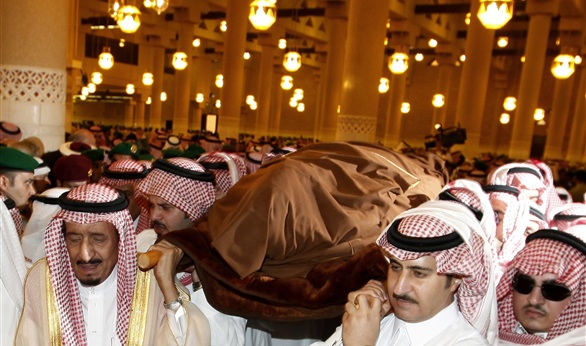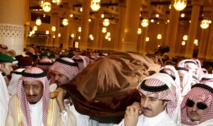Full diplomatic relations between the United States and the Gulf kingdom were established in 1940 during the throes of World War II.
The partnership was sealed five years later in a historic meeting between then king Abdul Aziz Ibn Saud and US president Franklin D. Roosevelt on board the USS Quincy as it cruised the Suez Canal.
It was the discovery of vast oil reserves beneath Saudi sands in the late 1930s which secured the kingdom's place as a vital partner for the energy-hungry United States, despite early disagreement on the establishment of Israel on the lands of British-mandated Palestine.
Indeed, at times Saudi Arabia has worked with Washington to advance US interests in terms of oil flows and prices.
But there has been increasing unease in Riyadh about Obama's pursuit of a nuclear deal with arch-foe Iran, as well as his commitment to energy independence.
"The most important part about the relationship is that the two sides need each other," Marina Ottaway, senior Middle East scholar with the Woodrow Wilson Center, told AFP.
"Saudi Arabia continues to remain important to the United States in terms of energy security ... and the Saudis have always felt in need of protection."
Riyadh's strategic location and unique spiritual authority as custodian of Islam's two holiest sites has meant it has been key in helping to shore up stability in a turbulent Middle East .
- 'Unparalleled cooperation' -
When neighboring Kuwait was invaded in 1990 by Iraqi dictator Saddam Hussein, then US president George H.W. Bush sent in more than 500,000 troops and launched Operation Desert Storm using US airbases in Saudi Arabia as vital staging posts.
It was "a moment of unparalleled cooperation between two great nations," Bush said in a statement Thursday, paying tribute to his "dear friend" Abdullah.
But expert Ottaway said the Saudi royals never truly forgave Washington for the subsequent overthrow of Saddam in the second Gulf War in 2003, which they "feel was a major blunder... because it opened the door to Iranian influence."
Ties had strained too after the September 2001 attacks on New York, when it was revealed that 15 of the 19 attackers were from Saudi Arabia.
"The Saudis... could simply not believe that 15 of their sons had hijacked these airplanes and done what they had done," Robert Jordan, a former US ambassador to Saudi Arabia, told National Public Radio.
"They literally were in denial."
A series of bloody 2003 attacks in the kingdom proved the turning point, turning Riyadh into a loyal and robust partner in the fight against Al-Qaeda.
Saudi warplanes were also among the first to fly alongside the US when it began a series of airstrikes last September against Sunni militants from the Islamic State group in Syria.
Underlying tensions flared last year however, when top Saudi officials were openly critical of America's reluctance to intervene more forcefully in Syria to oust long-time Saudi foe, President Bashar al-Assad.
"The relationship is not what it was ... in a dynamic and changing environment in the Middle East," said Salman Shaikh, director of the Brookings Doha Center.
He pointed to both Obama's policies and the style of his administration, amid a failure to make good on an early pledge to restore ties with the Muslim world.
- Awaiting change -
Ties were better under Bush and his son, president George W. Bush, as it was "a relationship that was very much built on personal foundations," Shaikh contended.
"In many ways a lot of Gulf leaderships are counting down the clock to when this administration leaves and the next one comes," he told AFP.
"There's nothing... that I would see that would make the relationship improve, because the US president is not going to do the things they want done," agreed Saudi expert and author Karen Elliot House.
The Sunni-Muslim majority kingdom remains wary of close US ties to Israel, as well as Washington's nuclear diplomacy with Shiite Iran, seen as Riyadh's "greatest external danger," House told AFP.
Political upheavals in Saudi's unruly neighbor Yemen, where Shiite Huthi rebels believed to be backed by Iran have spread chaos, have upped the ante.
"There's even more of a feeling in Gulf capitals that Iran is trying to encircle them," said Shaikh. "And this at a time when the US is seeking to see how Iran could come back into the fold through the nuclear issue."
-----------------------------------------------------------------------------------------------
The partnership was sealed five years later in a historic meeting between then king Abdul Aziz Ibn Saud and US president Franklin D. Roosevelt on board the USS Quincy as it cruised the Suez Canal.
It was the discovery of vast oil reserves beneath Saudi sands in the late 1930s which secured the kingdom's place as a vital partner for the energy-hungry United States, despite early disagreement on the establishment of Israel on the lands of British-mandated Palestine.
Indeed, at times Saudi Arabia has worked with Washington to advance US interests in terms of oil flows and prices.
But there has been increasing unease in Riyadh about Obama's pursuit of a nuclear deal with arch-foe Iran, as well as his commitment to energy independence.
"The most important part about the relationship is that the two sides need each other," Marina Ottaway, senior Middle East scholar with the Woodrow Wilson Center, told AFP.
"Saudi Arabia continues to remain important to the United States in terms of energy security ... and the Saudis have always felt in need of protection."
Riyadh's strategic location and unique spiritual authority as custodian of Islam's two holiest sites has meant it has been key in helping to shore up stability in a turbulent Middle East .
- 'Unparalleled cooperation' -
When neighboring Kuwait was invaded in 1990 by Iraqi dictator Saddam Hussein, then US president George H.W. Bush sent in more than 500,000 troops and launched Operation Desert Storm using US airbases in Saudi Arabia as vital staging posts.
It was "a moment of unparalleled cooperation between two great nations," Bush said in a statement Thursday, paying tribute to his "dear friend" Abdullah.
But expert Ottaway said the Saudi royals never truly forgave Washington for the subsequent overthrow of Saddam in the second Gulf War in 2003, which they "feel was a major blunder... because it opened the door to Iranian influence."
Ties had strained too after the September 2001 attacks on New York, when it was revealed that 15 of the 19 attackers were from Saudi Arabia.
"The Saudis... could simply not believe that 15 of their sons had hijacked these airplanes and done what they had done," Robert Jordan, a former US ambassador to Saudi Arabia, told National Public Radio.
"They literally were in denial."
A series of bloody 2003 attacks in the kingdom proved the turning point, turning Riyadh into a loyal and robust partner in the fight against Al-Qaeda.
Saudi warplanes were also among the first to fly alongside the US when it began a series of airstrikes last September against Sunni militants from the Islamic State group in Syria.
Underlying tensions flared last year however, when top Saudi officials were openly critical of America's reluctance to intervene more forcefully in Syria to oust long-time Saudi foe, President Bashar al-Assad.
"The relationship is not what it was ... in a dynamic and changing environment in the Middle East," said Salman Shaikh, director of the Brookings Doha Center.
He pointed to both Obama's policies and the style of his administration, amid a failure to make good on an early pledge to restore ties with the Muslim world.
- Awaiting change -
Ties were better under Bush and his son, president George W. Bush, as it was "a relationship that was very much built on personal foundations," Shaikh contended.
"In many ways a lot of Gulf leaderships are counting down the clock to when this administration leaves and the next one comes," he told AFP.
"There's nothing... that I would see that would make the relationship improve, because the US president is not going to do the things they want done," agreed Saudi expert and author Karen Elliot House.
The Sunni-Muslim majority kingdom remains wary of close US ties to Israel, as well as Washington's nuclear diplomacy with Shiite Iran, seen as Riyadh's "greatest external danger," House told AFP.
Political upheavals in Saudi's unruly neighbor Yemen, where Shiite Huthi rebels believed to be backed by Iran have spread chaos, have upped the ante.
"There's even more of a feeling in Gulf capitals that Iran is trying to encircle them," said Shaikh. "And this at a time when the US is seeking to see how Iran could come back into the fold through the nuclear issue."
-----------------------------------------------------------------------------------------------









 Home
Home Politics
Politics











